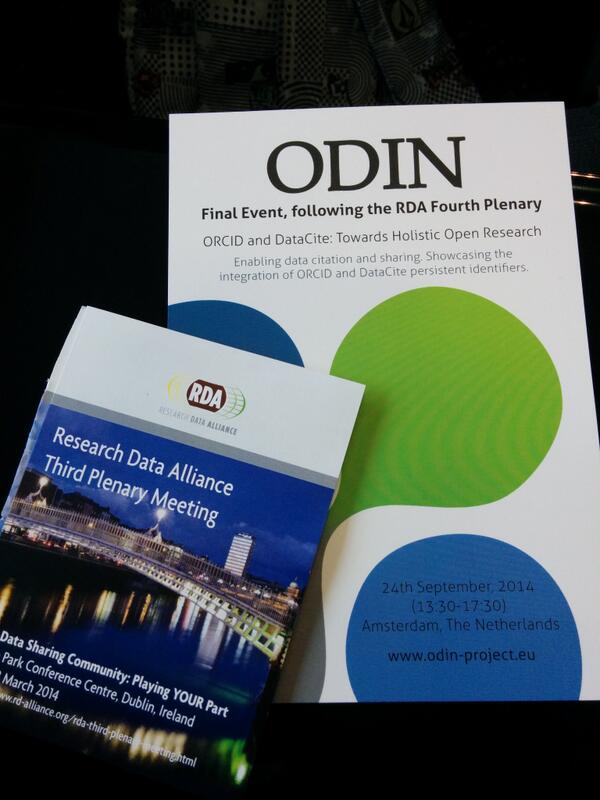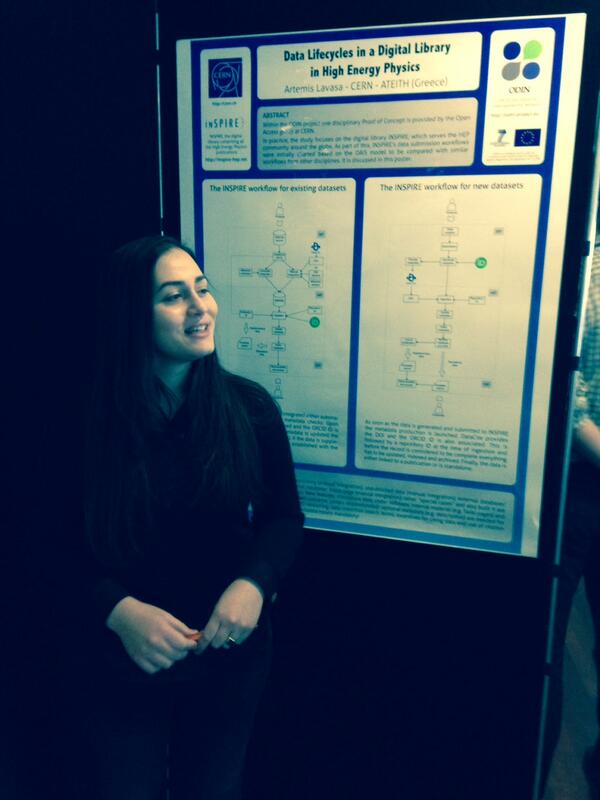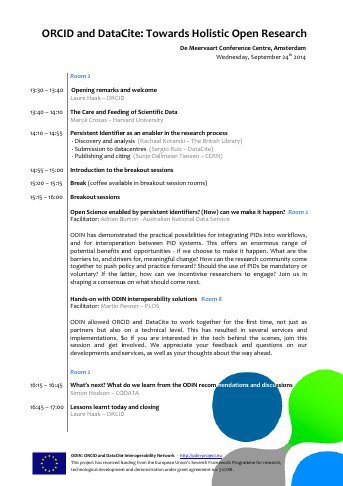ODIN’s second year has provided new insights as well as new developments regarding persistent identifiers. We have updated our material section with new documents, where you will find new information: checklists, recommendations, proof of concept examples…
Author: ODIN Project
ORCID and DataCite: Towards Holistic Open Research
ODIN’s final event took place the 24th September 2014 at the De Meervaart Conference Centre Centre in Amsterdam, from 13:30 to 17:00, collocated with the 4th Research Data Alliance Plenary.
We invited all those interested in research data citation, management, policy, evaluation and systems to join us for the event. We were delighted that additional context and experience were provided by the keynote speakers for the day, Dr Merce Crosas, Director of Data Science at IQSS, Harvard University, and Dr Simon Hodson, Executive Director of CODATA.
The final agenda is available
Great to see you all in Amsterdam!
Second data webinar: After ODIN – looking to the future
On September 9, 2014, the ODIN team hosted its second data webinar, where we discussed the detailed gap analysis generated during the project and the recommendations for the most urgent steps to overcome them. Moreover, the invited speakers talked about the future and how the would use the recommendations to build solutions for their communities.
If you couldn’t join us, all the talks are already available in our Webinars section!
ORCID and DataCite sign an MoU
Thanks to the ODIN collaboration, bonds are being strengthened.
ORCID and DataCite are pleased to announce their joint commitment to research data by signing a Memorandum of Understanding. ORCID and DataCite agree that data are essential building blocks of scholarship and research in the sciences, medicine, social sciences, and humanities. Researchers and scholars recognize the potential for increasing collaboration and synthesis when data are archived, published, and shared, forging the possibility for new discoveries built upon prior work. This vision requires that data be discoverable, citable, and connected to the people who created it. Reliable persistent data and researcher identification are essential to establish these links.
The two organizations are working together to improve and harmonize DataCite and ORCID metadata schemas for data and researchers, to develop new interoperable and open source APIs for our services, and to create complementary user services.
Follow our OR2014 panel on-line!
If you are not in Helsinki today but you want to follow the ‘Promoting Interoperability and Services Through Shared Identifiers’ Panel, at 11:15AM GMT+3, you can do it through Adobe Connect here:
https://connectpro.helsinki.fi/or2014_parallel1/
You will find more details about the panel in the OR2014 website and in our Conferences section!
Looking forward to the OR14 Developer Challenge!
The ODIN delegation are arriving in Helsinki to participate in OR14, and the technical team are very excited about the Developer Challenge. The recent ODIN Data Webinar was a huge success, and has hopefuly served to whet your appetitie for building something new with us. The slides also contain a huge number of useful links toORCiD and DataCite resources, so do take another look.
Our previous codesprints have produced some very cool stuff indeed, and we’re looking forward to being surprised all over again by the creativity and ingenuity of the OR developer community.
Just to stimulate a few ideas, and to add to your toolbox, there are a few resources and some already-existing code that might be useful…
Tom Demeranville has written a Java ORCiD Client that should be useful for any Java developers out there. It models the public API and a few other things, including OAuth and updating works. There’s documentation on github and it’s available via Maven.
There is also a good resource in the ORCiD popular client libraries which might serve to spark off a few interesting thoughts… And you can check DataCite’s Dev Challenge dedicated page as well!
In case you need any more inspiration, here’s a non-exclusive list of possibleareas on which to focus:
- Data author discovery or disambiguation
- Tracking institutional output
- Curation or collaboration tools
- Linking related research objects
- Tracking of citations or alternative metrics to data
- Allowing personal repositories to take advantage of ID systems
See you in Helsinki, and happy coding!
First ODIN Webinar
On June 4, 2014, the ODIN team hosted a data webinar, demonstrating the APIs, tools and resources available to help anyone interested in building on ORCID and DataCite services. We also showed off some of the innovative possibilities created by the project, with a demonstration of the proof-of-concept tools built at CERN to serve the High-Energy Physics community.
We were delighted with the response to our invitation to the webinar, and more than 120 people joined us on the day. Many others wanted to attend but could not, and to serve this group, as well as attendees who have asked to access recordings and materials from the webinar we have made the video recordings of the webinar presentations available here.
Thanks to everyone who joined us and helped to make it such an interesting session, and watch out for members of the ODIN team at Open Repositories 2014 in Helsinki next week, where we will be actively participating in the developer challenge and participating in a plenary panel session.
The videos and slides are already available in our Webinar section!
ODIN in Open Repositories 2014
ODIN partners are heavily involved in the Open Repositories this year. We organize a panel discussion and a developers challenge, meaning that we do not only want to discuss and explain persistent identifiers, but also trigger some “hands-on” development on the latest DataCite and ORCID APIs. We hope to see you around!
But lets look at the details:
The dev challenge starts on Monday, the 9th of June. DataCite and ORCID technical staff will provide a technical walk-through to introduce developers to the current APIs. Technical staff will be on-hand throughout the days to answer questions and actively facilitate participant projects. This challenge is to use the open APIs provided by DataCite and ORCiD to build an application or service based on these persistent, shared, and open identifiers.
A non-exclusive list of possible areas on which to focus:
- Data author discovery or disambiguation
- Tracking institutional output
- Curation or collaboration tools
- Linking related research objects
- Tracking of citations or alternative metrics to data
- Allowing personal repositories to take advantage of ID systems
If you have an idea already, don’t hesitate to contact us and share it!
As an appetizer for the challenge, we organize a webinar where you can learn about the latest tech details ahead of time. It will take place the 3rd of June and you can find all the details here!
The panel discussion is on Thursday 12th
The panelists will discuss projects underway to test the use of shared persistent identifiers to support interoperability between research systems, how such interoperability affects data sharing and citation, and how it can serve as a springboard for new services. Speakers from ORCID and DataCite will discuss implementation challenges for persistent identifier registries, including community engagement and support for development of third-party services. Dryad and CERN will focus on the challenges and opportunities for integrating shared persistent identifiers.
The discussion will focus on the challenges ahead of use: While substantial progress has been made, there are still steps to take, including disciplinary requirements and engagement of the researchers themselves in using the identifiers and data-sharing tools. One demanding domain is data publication, which involves new forms of citation, questions on how authorship should be treated, and lack of standards for crediting researchers who share their data.
By the way, if you are interested in us, the ODIN’s partners, this is the unique opportunity to meet most of us in person. Our colleagues even come from Australia. So, drop us an email if you want to share a drink!
For any further details, visit our OR14 section.
Research Data Alliance: toward better data discovery
Research data has been the main focus of data intensive scientific discovery for more than a decade; however, these days it has a wider audience both in scholarly community and public sector. Research data is transforming to be a first class outcome of research, and a key enabler for research collaboration.

The third plenary of Research Data Alliance (RDA) in Dublin (March 2014) was a good demonstration of raising the international interest in research data. More than four hundred researchers and policy makers got together to talk about the future of research data and data infrastructure.
Researchers are interested to…
-
discover datasets related to their research,
-
enable other researchers to discover their datasets and develop new collaborations,
-
identify high impact datasets (highly cited or the result of major research funding), and
-
find where their data has been reused in scholarly work.
While funding agencies and university administrators are keen to…
-
discover the impact of their investment in research and research data, and
-
identify the opportunities for research collaboration where their investment in research data can lead to new collaborative research and innovation.
Given the strong interest in discovery of research data among RDA members, interoperability was a key topic of discussion in many RDA groups, and DataCite and ORCID played an important role in these discussions. While DateCite is providing unique identifiers for datasets, ORCID enables the researchers to link these identifiers to their author identifiers, creating an open and transparent connection between researchers and their research outcome.
The interoperability between ORCID and DataCite is essential to build a fabric of collaboration among research capabilities, and ODIN is the manifestation of this collaboration. It is apparent that ODIN outcome can be adopted with many RDA communities; hence it is important for ODIN members to continue communication of ODIN achievements with the RDA groups, and share the lessons learnt from this project.
Find ODIN at RDA!

Many of our partners are present at the Research Data Alliance Third Plenary (RDA) that happens right now in Dublin. We also announced our final event, which will take place right after the fourth RDA plenary in September in Amsterdam.
ODIN’s Final Event, 24th September 2014
If you are around, come and see the ODIN poster. Artemis Lavasa charted a data management workflow within a digital library in High-Energy Physics. We are currently working on comparing this with Humanities and Social Sciences and many other disciplines. We pay particular attention to persistent identifiers and their role during the process.

If you have similar experiences in your discipline, feel free to mail us and share your workflows. We are happy to include as many points of view as possible.
In any case, stay tuned for our reports that are due this summer!
See you at RDA!
